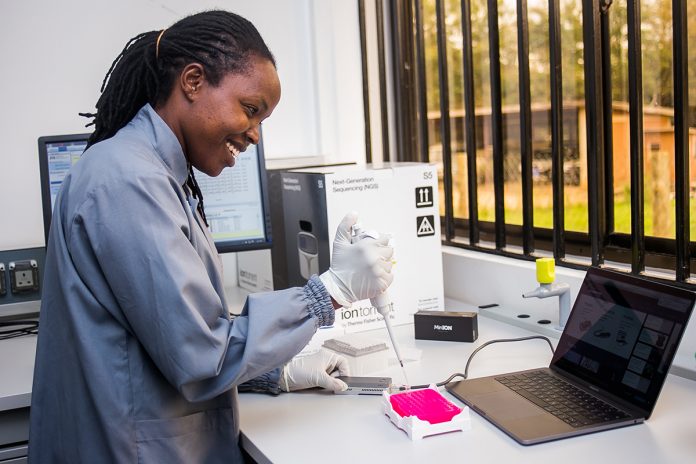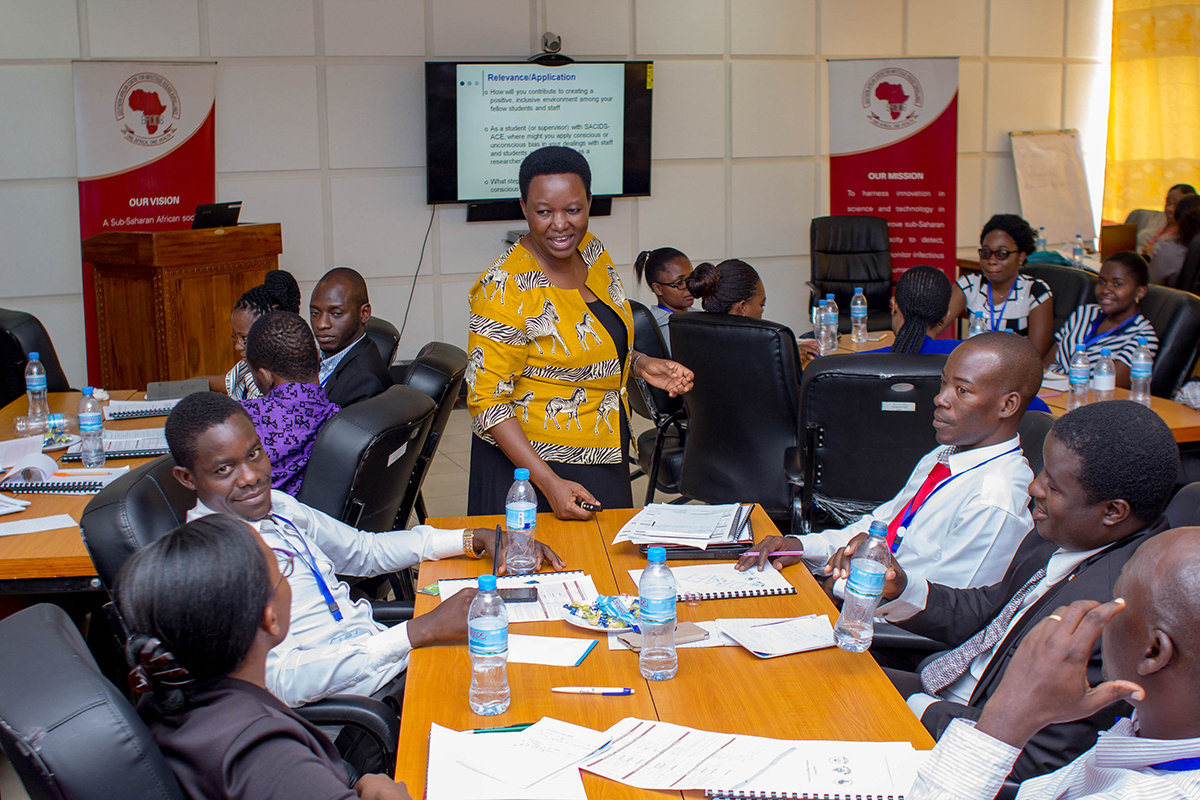
The Southern African Centre for Infectious Disease Surveillance detail the issues around the detection, identification and monitoring of infectious diseases in Africa today
The Southern African Centre for Infectious Disease Surveillance – Africa Center of Excellence for Infectious Diseases of Humans and Animals in Southern and Eastern Africa (SACIDS – ACE), is a One Health partnership of medical and veterinary institutions. The core partnership of the centre is Sokoine University of Agriculture (SUA), Muhimbili University of Health and Allied Sciences (MUHAS) and the Tanzania National Institute for Medical Research (NIMR).
The vision and mission of the centre are rooted in the quest for enhancing Africa’s capacity for the science of evidence-based risk management where infectious diseases are concerned through the One Health approach. The focus of SACIDS – ACE is to address infectious diseases in the African endemic settings through a collaborative effort between natural and social sciences to advance the understanding of interactions between humans, animals and the environment to improve public and animal health. The centre proactively pursues the goal of developing an effective African research capacity for infectious diseases through postgraduate training and research programmes that focus on African problems, through the lens of African health and economic development and in context of the global agenda.
In 2008, concerned by the burden of infectious diseases in Africa, academic and research institutions in epidemiologically linked southern and East African countries (Tanzania, Democratic Republic of the Congo (DRC), Zambia, Mozambique and South Africa), we embarked on a pathway towards developing Africa’s capacity for research and training in infectious diseases. We formed a One Health partnership of medical and veterinary institutions (i.e. Southern African Center for Infectious Disease Surveillance – SACIDS), aiming for an African-led centre that has progressive relevance to the wider Sub-Saharan region.
We have strengthened training and student-based research, developed competencies in molecular biology and analytical epidemiology, tested innovative approaches and have worked across sectors, institutions and borders, in partnership with internationally renowned centres of training and research excellence. SACIDS is led by Sokoine University of Agriculture (SUA), with core collaboration by the Muhimbili University of Health and Allied Sciences (MUHAS) and the National Institute for Medical Research (NIMR) to consolidate the inter-sectoral partnership. The SACIDS vision and mission is to enhance Africa’s capacity for the scientific evidence-based risk management of infectious diseases, through the One Health approach. The SACIDS ‘One Health’ capacity development focus is to address infectious diseases in the endemic settings of sub-Saharan Africa, with particular attention paid to southern, central and east Africa, through a collaborative effort between natural and social sciences to advance the understanding of interactions between humans, animals and the environment to improve both public and animal health.
According to studies by the World Bank, WHO, FAO, OIE and others, infectious diseases account for around 40-50% of morbidity and mortality in humans today, while for animals they constitute a major constraint to livestock-dependent livelihoods and the single most important barrier to the export of African livestock commodities to the lucrative markets of the OECD and G20 countries. Our focus on infectious diseases is driven by the realisation that Africa probably has the highest burden of infectious diseases in the world and yet, it has the least capacity for risk management in this area. The 2006 Foresight Report on future risks of infectious diseases, emphasises that Africa needs innovative, Africa-led approaches to enable it to make the necessary quantum leap to accelerate the development of its scientific capacity for infectious diseases. One such innovative approach, the concept of a Virtual Centre, links several institutions into a single entity to accelerate the training and generation of the necessary critical mass of expertise required.
Ten years after we formed SACIDS, the centre consolidated itself progressively and evolved into two formal regional centres of Excellence for Infectious Diseases of Humans and Animals, under the Sokoine University of Agriculture (the SACIDS – ACE) and the University of Zambia (ACEIDHA). The core strategy of the SACIDS-ACE is based on three principles: (i) Virtual Centre – by which the hosting and leadership of the SACIDS-ACE are by SUA – in very close collaboration with national university and research institutions – with expertise, resources and programmes that are relevant to the objectives of SACIDS-ACE. Specifically, these are Tanzania Veterinary Laboratory Agency (TVLA), Tanzania Wildlife Research Institute (TAWIRI), Muhimbili University of Health and Allied Sciences (MUHAS), Tanzania National Institute for Medical Research (NIMR) and Catholic University of Health and Allied Sciences (CUHAS); (ii) Smart Partnership by which SACIDS-ACE at SUA draw on the expertise and resources of the SACIDS member/ partner institutions in South Africa, Mozambique, Zambia, DRC, Uganda, Kenya and the UK and; (iii) Community of Practice (CoP) approach, by which we undertake research within defined themes and link students and their co-supervisors and mentors across the wider smart partnership into a CoP that constantly shares experience and learning.
Accordingly, the research programme of SACIDS-ACE falls under three strands: (a) Addressing viral disease threats to human health, food security and livelihoods – including emerging diseases, for example, Ebola and vector-borne diseases, for example, Rift Valley Fever (RVF), Dengue, Chikungunya, Zika; as well as livelihoods and food security diseases, such as Foot-and-Mouth Disease, Peste des Petits Ruminants (PPR) and African Swine Fever; (b) Addressing neglected tropical infectious diseases, with a focus on those that cause chronic disease and disability, with severe health, economic and social consequences that impact on the quality of life and livelihoods in low income or marginalised communities, especially women, children and people with disability; including genomic surveillance for anti-microbial resistance; (c) Addressing community level one health security, with a focus on rural, remote, cross-border and marginalised communities, through digital technology supported disease surveillance, epidemiological modelling and integrative EcoHealth approaches, including socio-economics and anthropology.

We recognise that the risk from infectious disease arises from: (i) New pathogens or new strains of existing pathogens through genetic change; (ii) New human diseases from animal reservoirs (about 75% of emerging diseases of humans have an animal origin); (iii) Drug-resistant organisms; (iv) Increasing the international movement of people and commodities, including animal commodities, thanks to globalisation; (v) Climate change and; (vi) Human economic activities (for example, settlements that encroach on forest ecosystems) and cultural/social behaviour. Yet, for Africa, there are additional risks associated with endemicity of high-risk pathogens that are either peculiar to the country or have been largely eliminated elsewhere; including the so-called neglected tropical diseases and with Africa’s inadequate capacity for risk management of epidemics. The recent Ebola virus disease (EVD) epidemic in West Africa has illustrated both the risk and the inadequacy of response in Africa. It should also be noted that the epidemics of Ebola since 1976 have been characterised by a period of “undiagnosed/unrecognised” disease for two to four months.
The risk management of epidemics relies on four basic tenets: (a) Scientific expertise based on in situ research, diagnostic, epidemiological and socioeconomic analytical competencies; (b) The availability of a critical mass of clinical, public health and animal health expertise; (c) The availability of a critical mass of a diverse expertise and competencies in a variety of operational disciplines, including administrative and logistic expertise and; (d) An enabling health system, infrastructure and governance. We believe that African universities are well suited to contribute to the first two of these tenets.
Since its formation, SACIDS has enhanced collaboration between medical and veterinary member institutions. We have established a track record for innovative approaches to developing Africa’s research capacity for epidemic infectious diseases of humans and animals. Our mission is driven primarily by our strategic objective for an African-led development of world-class researchers and research leaders in the country. The centre proactively pursues the goal of developing an effective African research capacity for infectious diseases through postgraduate training and research programmes, that focus on African problems in terms of economic development and the global agenda.
The centre facilities at SUA, MUHAS and NIMR boast a well-equipped molecular biology laboratory, including nucleic acid amplification, conventional capillary DNA sequencing and next generation sequencing using the Ion Torrent and Nanopore MinION sequencers. It has video conferencing facilities and access to the SUA ICT-learning platform. It has set up a TechnoHealth Innovation Laboratory to design digital solutions and support disease surveillance. It has access to conventional virology facilities for cell culture and Biosafety Levels 2 and 3 units for the safe handling of pathogens. It has community radio to link academic and research specialists directly with communities in remote areas.
Our training strategy focuses on developing students who can apply the principles of molecular biology or epidemiology in a One Health context to the understanding and management of infectious diseases, through a tiered postgraduate training programme. The emphasis is on self-driven learning, which aims to develop critical thinking skills and retaining knowledge that leads to self-actualisation. Training focuses on seven strands, i.e.: (i) A taught Master’s Programme that involves one year’s worth of coursework plus one year’s guided research; (ii) A MPhil/MSc- Research that involves two years research; (iii) PhD development; (iv) Postdoctoral programme; (v) Structured short courses for students and practicing professionals that cover a variety of disciplines, that includes bioinformatics, biosafety, statistics; (vi) Annual One Health driven two-week summer schools; (vii) A novel programme for research leadership and management for PhD students, supervisors and senior academic staff. Course delivery modes include: fully face-to-face, web-enhanced, flipped, blended/hybrid and fully online (e-books, e-resources, e-journals). Laboratory training provides knowledge of both the strengths and limitations of each method to empower students to interpret experimental data.
SACIDS ACE aims to train Master of Philosophy, Master of Science by Research and PhD fellows and recruit postdoctoral fellows. Funding for these fellowships is already available from the Government of the United Republic of Tanzania through the World Bank and the Regional Scholarship Innovation Fund (RSIF) of the Partnership for Skills in Applied Sciences, Engineering and Technology (PASET). The Centre has a rigorous selection and performance appraisal system in place for both students and supervisors. It also offers short courses for students and in-service practitioners and biennial One Health Summer Schools, as well as research leadership and management, including equity issues, such as gender and marginalised communities.
The core partnership for the centre is SUA, MUHAS and NIMR. National Partners are the Catholic University of Health and Allied Sciences (CUHAS), Tanzania Veterinary Laboratory Agency (TVLA) and Tanzania Wildlife Research Institute (TAWIRI). Regional Partners are the South African National Institute for Communicable Diseases (NICD); The University of Zambia (UNZA); Stellenbosch University, Division of Molecular Biology and Human Genetics; University of Pretoria Faculty of Veterinary Science; Eduardo Mondlane University (UEM/EMU); University of Kinshasa (UNIKIN), The Biomedical Research Institute, Kinshasa; the ARCOnderstepoort Veterinary Institute (ARC-OVI), South Africa; The Uganda Virus Research Institute (UVRI); The Kenya Medical Research Institute (KEMRI) and; the International Livestock Research Institute–Biosciences eastern and central Africa (BecA) hub in Nairobi, Kenya.
Beyond Africa, partners are the London School of Hygiene and Tropical Medicine (LSHTM), the Royal Veterinary College (RVC), the London International Development Center (LIDC), the Pirbright Institute (TPI), Ranmore Consulting (UK) and the Policy Institute of King’s College, University of London, plus a wider international collaboration on a tactical basis. Our institutional membership of CORDS (Connecting Organisations for Regional Disease Surveillance) enhances our South-South-North networking abilities on infectious diseases by linking us with institutions, organisations and networks in Southeast Asia, Middle East, Southeast Europe, Northern Europe and the U.S., as well as with WHO, OIE and FAO. SACIDS continues to explore opportunities for additional international partnerships in a South-South-North Smart Partnerships that aims to enhance Africa’s capacity for infectious diseases of humans and animals in a One Health approach. To this end, we have already established linkages with Korea Institute of Science and Technology (KIST) in the Republic of Korea, The Oswaldo Cruz Foundation in Brazil and Virginia Polytechnic Institute and State University (Virginia Tech) in USA.
Industry partners are ZENUFA Tanzania Ltd and the Botswana Vaccine Institute (BVI). We are currently developing an in-house capability for biologicals (vaccine and diagnostics) development and trials through a USAID collaborative grant with the University of Texas El Paso and link with a Moroccan commercial company (MCI). In this vein, a conceptual framework for developing a SACIDS Innovation Hub for partnership with industry and the private sector is defined.
Please note: this is a commercial profile
Professor Gerald Misinzo
Leader
Southern African Centre for Infectious
Disease Surveillance – Africa Centre of
Excellence for Infectious Diseases of
Humans and Animals in Southern and
Eastern Africa (SACIDS – ACE)
Tel: +255 7670 58805










